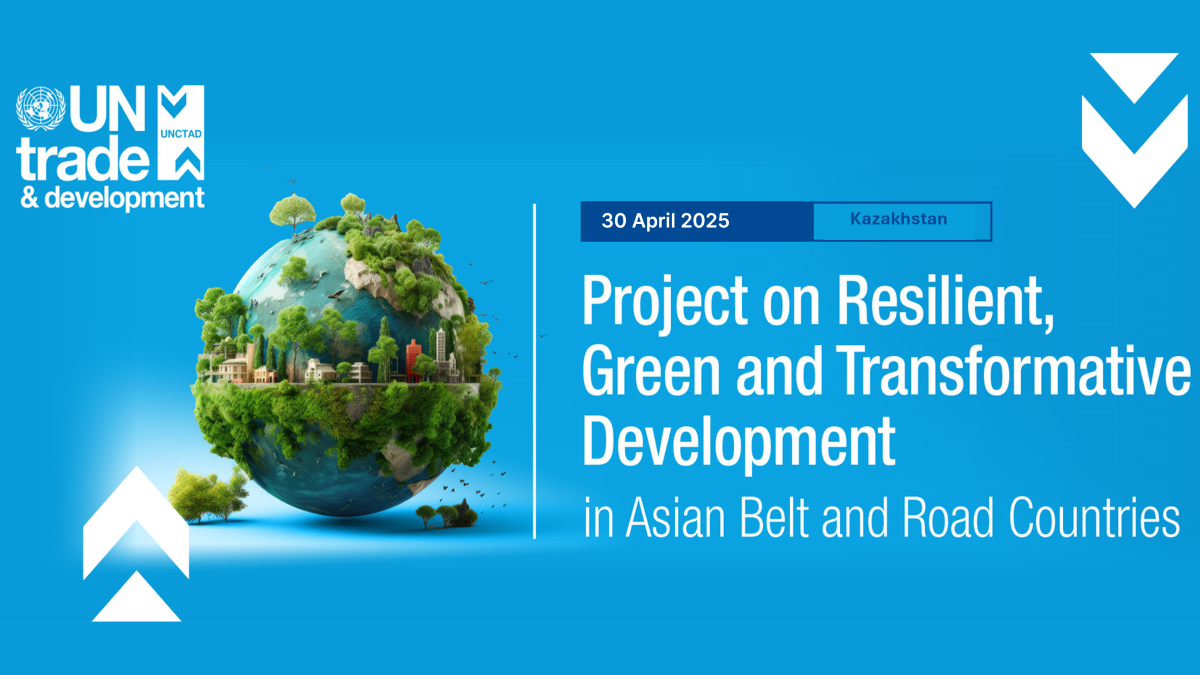Given pressing multifaceted challenges of climate change and development, it is more imperative than ever for developing countries to adopt innovative and integrated policy strategies to pursue resilient, green, and transformative development. To contribute to the debate on how to address these multifaceted challenges from the perspective of developing countries, United Nations Trade and Development (UNCTAD) has developed a project that aims to assist four major developing countries in Asia – Kazakhstan, Malaysia, Pakistan and Türkiye - in their efforts to meet the Sustainable Development Goals (SDGs) related to green transformative development. In particular, the project is designed to assist the participating countries in achieving the 2030 Agenda through 1) effective integrated policy strategies and improved capacity at national level, including South-South peer-learning; and 2) economic cooperation and policy coordination at the regional level.
As an upper-middle income land-locked country rich in natural resources that continue to provide its most important source of income, Kazakhstan remains vulnerable to complex climate change challenges in the form of extreme weather events and natural disasters, such as droughts, irregular rainfall and floods, abnormal summer heat and extreme winter cold, in addition to long-standing water shortages. Adapting to climate change through green industrialisation is therefore of crucial importance to addressing the twin challenges of much needed structural transformation and diversification as well as effective disaster risk reduction.
Kazakhstan recognised these challenges early on, beginning with the 2007 Environamental Code and with the Concept for Transition of the Republic of Kazakhstan to a Green Economy (Akorda, 2013). In the decade since, Akorda has been further developed, with many provisions and parameters being clarified, specified and expanded (Akorda 2021), not least following Kazakhstan’s ratification of the Paris
Agreement in 2016. The country’s Environmental Code also was updated in 2021, and key recent planning documents for climate change adaptation include the Doctrine of Kazakhstan on achieving Carbon Neutrality by 2060 through a strong commitment to increase renewable energy capacities and enhancing energy efficiency as well as the updated Nationally Determined Contribution for 2021-2030.
Purpose and key objectives
Under this project, UNCTAD in close cooperation with its local partner, the Project Office of Central Asia for Climate Change and Green Energy/Central Asia Climate Fund (CACF), held a first national consultation in October 2023 to identify and discuss binding constraints and core challenges for the effective implementation of Kazakhstan’s green structural transformation agenda with local stakeholders in government, the private sectors and civil society. The meeting furthermore highlighted the importance of regional cooperation and policy synergies to further support national policy strategies for green transformation.
This second high-level consultation comes at an opportune moment for Kazakhstan that will host the 2026 Regional Climate Summit in Central Asia under UN auspices. Building on key insights gained at the first national consultation, UNCTAD and its local partner have joined efforts to produce a proposal for integrated national policy strategies to further and effectively promote green transformation and industrialisation in Kazakhstan, for discussion by meeting participants. In addition, UNCTAD will present main findings of a modeling exercise to consider the medium- and long-term impacts of climate change and government policies on growth performance, labor market dynamics and income distribution in Kazakhstan. Finally, there will be an opportunity to further develop earlier discussions on the role and potential of regional synerggies and partnerships for assisting national efforts in promoting green transformation.

